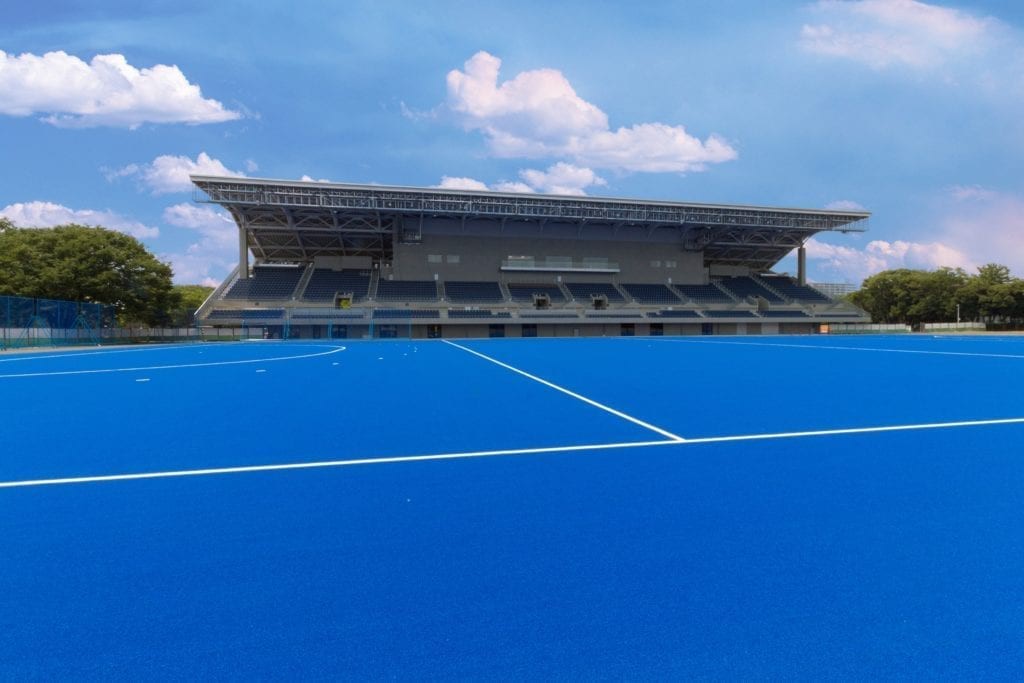How sustainable can modern high-tech sports surfaces made from synthetic material get? Polytan gave the answer to that question at this year’s FSB in Cologne, the leading international trade fair for public space, sports and leisure facilities. There the Burgheim-based sports surface specialist presented four innovations from its Green Technology initiative, which includes both products and services. It has given rise to a new product line that features particularly eco-friendly sports surfaces.
Climate change, microplastics, particulates and pollutant emissions – these are the issues that will occupy us now and in the future. How we deal with them is an even greater challenge for companies that process plastics than for manufacturers in other industries.
Polytan is facing up to this responsibility: two years ago, it launched the Green Technology product range, which features particularly sustainable products. All life cycle phases of a product are taken into consideration – from selection of the raw material through production, installation, use and maintenance all the way to disposal and recycling. The aim is to supplement the product range step by step with environmentally-compatible innovations and move over entirely to Green Technology in the long term, but without having to suffer any loss of quality in terms of the performance and long life of the synthetic turf systems, tartan tracks and soft-impact surfaces.
Natural raw materials and CO2-reducing manufacturing processes
The good environmental balance of the sports surfaces from the Green Technology range is founded on bio-based plastics that are obtained from sustainable agriculture, rapidly renewable natural raw materials and new manufacturing processes that produce lower CO2 emissions. For that Polytan requires experienced partners from the industry, which the Burgheim sports surface specialist has found in the world market leaders Braskem, for bioplastics, and Covestro, for polymer materials.
Poligras Tokyo GT – synthetic hockey turf made of 60 per cent sugar cane
The new Poligras Tokyo GT synthetic hockey turf made its début at FSB 2017. It was developed for the hockey pitches of the 2020 Olympic Games in Tokyo in cooperation with the international hockey federation, the FIH. The synthetic turf’s impressive eco-balance stems from the use of the bio-based I’m greenTM polyethylene plastic from Braskem: obtained from renewable raw materials, this plastic accounts for 60 per cent of the base material for the filaments. The sustainable raw material has the same good properties as the original, crude oil-based polyethylene. Many hockey pitches are already equipped with it, including the Sparkassenpark Mönchengladbach and the Bisham Abbey National Sports Centre in England. Another plus point for players and spectators is that the hockey turf is not only more sustainable that its predecessor models, but also much faster, which means exciting matches are in store!
LigaTurf Cross GT – world’s first CO2-neutral synthetic football turf
In the LigaTurf Cross GT synthetic turf, Polytan has presented the first CO2-neutral synthetic football turf in the world at this year’s FSB. It is a refinement of the successful LigaTurf Cross turf in which smooth and crimped fibres were combined for the first time.
Like the Poligras Tokyo GT hockey turf, it is made from the bio-based I’m greenTM polyethylene plastic from Braskem. The already excellent eco-balance is boosted even further by the switchover of production to 100 per cent green electricity and the optimised manufacture of the back coating of the synthetic turf.
Fusion GT – sustainable infill made from 70 per cent natural material
Polytan’s Green Technology product range now contains an infill made from renewable raw materials that significantly improves the playability of the synthetic surface in all weathers and offers first-class functional sports properties. The Fusion GT is a combination of selected, highly elastic EPDM plastics and particularly sustainable raw materials. Its elasticity enhances player comfort and contributes to active player protection against injuries and grazes. Despite its impressive eco-balance, the infill is resistant to UV and weathering and robust against mould formation. The particular shape of the crumb and the low bulk weight reduce the infill quantity required by around 20 per cent – another aspect that improves the sustainability of the product.
PolyBase GT – elastic layer with CO2-reducing binder
Elastic layers form the basis of modern synthetic turf systems from Polytan, which retain their consistently high elasticity for more than 30 years. They are made from recycled elastic materials. The innovative PolyBase GT product has been made even more sustainable by the use of a new binder from Covestro, the manufacture of which uses carbon dioxide as the raw material, saving on fossil resources such as crude oil.

Source
Polytan, press release, 20109-11-04.
Supplier
Share
Renewable Carbon News – Daily Newsletter
Subscribe to our daily email newsletter – the world's leading newsletter on renewable materials and chemicals










